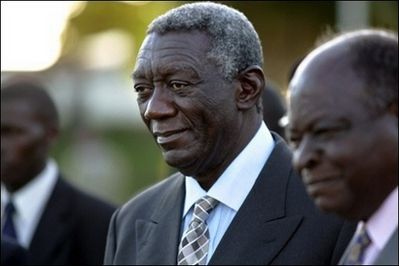|
African Union head meets
Kenya's feuding parties.
(Nairobi,
January, 09 2008 Ceegaag
Online)

African Union chief John Kufuor met Kenya's president and
opposition leader on Wednesday to try to break a political
impasse behind post-election turmoil that has killed about
500 people.
Kufuor, the president of
Ghana, first met President Mwai Kibaki at his State House
office and residence, then went straight to a hotel for
talks with Raila Odinga.
He says he was cheated of
winning the Dec. 27 vote by fraud.
The crisis has dented
Kenya's reputation for stability in a turbulent corner of
Africa, hurt key
economic sectors like tourism and tea, and tainted Kibaki's
previous reputation as a gentlemanly leader with a penchant
for P.G. Wodehouse novels.
Long used to receiving
refugees from neighbouring hot-spots like Sudan and Somalia,
Kenya now has more than a quarter of a million of its own
internally displaced people, many the victims of fighting
between different ethnic groups.
In a statement after their
meeting, Kibaki's office said the president assured Kufuor
he was initiating dialogue and "would continue to reach out
to Kenyan leaders."
Kibaki has implied he could
bring opposition figures into government and invited Odinga
to a face-to-face meeting on Friday. But the opposition
leader has declined, saying such a meeting would be a
"sideshow" without an international mediator.
"There can be no lasting
solution without justice," Odinga said after meeting a
visiting group of former African leaders.
Kufuor made no public
comment after his meetings.
Kibaki's naming of 17
ministers late on Tuesday sparked more violence around east
Africa's largest
economy.
Kenya's main paper, the
Daily Nation, said the appointments -- which included a
defeated presidential candidate and several figures hated by
the opposition -- may "poison the atmosphere".
"It will be seen as a sign
of bad faith ahead of the discussions about to begin," the
newspaper said.
FOREIGN PRESSURE
Within minutes of the
cabinet announcement by Kibaki, hundreds of rioters built
burning barricades and stoned cars in Kisumu, a western
stronghold of the opposition.
In Nairobi, opposition
supporters also came out in the slums, some of them
brandishing machetes.
"They are going wild. They
are very angry about the new cabinet," said Onyango Apudo, a
boxer living in the Mathare shanty-town. At least three
people died in the flare-ups.
Kibaki made his first
public foray on Wednesday since his disputed re-election,
visiting thousands of refugees in the Burnt Forest area,
near Eldoret in west Kenya, one of the areas worst hit by
ethnic killings.
Speaking on a hastily
erected wooden stage draped in Kenya's national flag, Kibaki
told a crowd of several thousand displaced people that he
would catch those behind the violence.
"The government will arrest
them and charge them in court -- they know who they are," he
said, to cheers.
He urged people not to fear
"backward, savage people" and promised assistance to rebuild
homes and re-start agriculture.
Officials say 486 people
have died in election-related violence. But aid workers put
the figure at more than 500, and the opposition say the toll
could be nearer 1,000 from clashes between police and
protesters, ethnic fighting, and looting.
International pressure for
a negotiated solution is growing.
Washington
says the presidential vote count was "obviously flawed"
while London calls
it "plagued by irregularity".
Possible scenarios being
touted include a power-sharing arrangement or a fresh
election.
But there is deep distrust
between Kibaki and Odinga, a former political prisoner and
wealthy business owner who helped Kibaki win a 2002 poll but
was sacked from government in 2005.
Stoking opposition ire,
Kibaki kept several controversial figures in his new
cabinet, including former hardline Internal Security
Minister John Michuki who moved to the roads ministry.
His naming of Kalonzo
Musyoka as vice-president, perceived by many as a bid to
bring his Kamba tribe on board, prompted some attacks on
that group.
Source: Reuters

webmaster@ceegaag.com |

